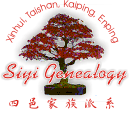

It seems every nationality has a few major surnames. With the British the big threes are: Smythe, Jones and Williams. Schultz, Mueller, and Schmidt are the German counterparts. What are the Chinese equivalent? China has not three but four major surnames, Cheung (ň╝íZ), Chiu (ŔÂíZ), Lee (íZíZíZ), and Wang (íZíZíZ). They account for 25% of it's total population.
Of the four which is the most common? Again there is no clear cut answer. I've read articles quoting statistics which had ranked Lee, Wang or Zhang at the top. We'll just have wait till publication of China's next census results. However with the nature of statistics even then one can't be certain.
Let's continue with this number business. The next six most common surnames: Chen (íZíZíZ), Yang (ŠąíZ), Ng (íZíZíZ), Lau (íZíZíZ), Wong (Ú╗íZ), Chow (íZíZíZ) account for another 15% of China's total population. In another word forty percent or 520 million of China's population share ten surnames only.
The next 35 big surnames account for another 30% of China's population. This means that 70% of its population or 910,000,000 people share forty-five surnames only. What does this mean? Just imagine tripling the total population of the USA but with only 45 surnames to go around. Kind of mind bogging isn't it? Wait, don't go yet! One last though, now try to image the entire USA population is made of four surnames only? Am I smoking anything funny? No, because that's how many people China's four most common surnames work out to be.
Trying to get a handle on the number of Chinese in a Western country through official records such as census is very difficult. This due to China's countless number of dialects each surname can have multiple spelling when translated into English. It also depended upon the whim of the immigration official at the point of entry. Then there is the Chinese tradition of surname first and given name last which some immigration officials had mistakenly took the given name as surname. To complicate this further two major systems for transition have been in use: the Wade-Giles and the more recent pinyin. Each system producing entire different spelling for the same surname. Then there are cases where people or the immigration official deliberately took a more mainstream sounding surname. Some examples are:
ŠóíZ from Leung to Long
ÚžíZ Locke instead of Lok
šżíZ from Lo to Law, Low, Lowe
íZíZíZ Louie instead of Lui
ÚŽíZ From ma or Mah to Marr
Ú║íZ from Mak to Mack or Mark
íZíZíZ from Shao to Shaw